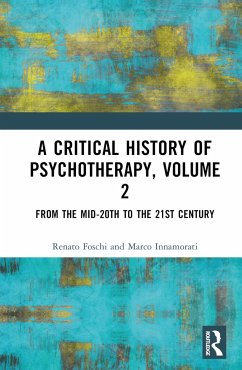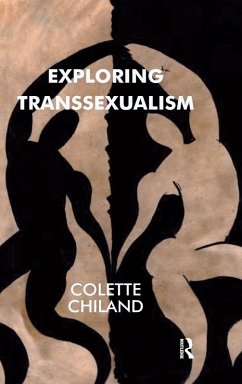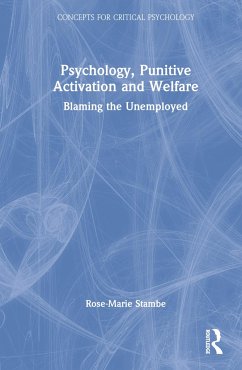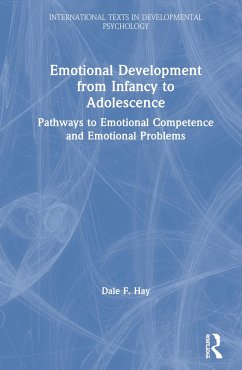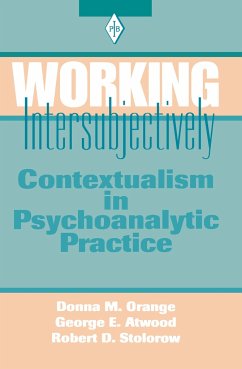Miguel Roselló-Peñaloza
Gebundenes Buch
NO BODY
Clinical Constructions of Gender and Transsexuality - Pathologisation, Violence and Deconstruction
Versandkostenfrei!
Versandfertig in 1-2 Wochen
Weitere Ausgaben:

PAYBACK Punkte
83 °P sammeln!





This pioneering book presents a novel analysis of transgender constructions within a clinical setting, examining the experiences of 'transsexuality in treatment' interpreted through psychological, feminist, post-structuralist and queer theories.
Miguel Roselló-Peñaloza is Professor in the Faculty of Health and Social Sciences at the Universidad de Las Américas, Chile. His research interests include feminisms and queer theory; the construction of difference and stigmatisation based on sex, gender and sexual practices; and deconstruction of psychopathology and power relations in science, clinical practices and public politics.
Produktdetails
- Verlag: Routledge
- Seitenzahl: 126
- Erscheinungstermin: 15. Mai 2018
- Englisch
- Abmessung: 222mm x 145mm x 11mm
- Gewicht: 300g
- ISBN-13: 9781138227248
- ISBN-10: 1138227242
- Artikelnr.: 52642577
Herstellerkennzeichnung
Libri GmbH
Europaallee 1
36244 Bad Hersfeld
gpsr@libri.de
"An important contribution to the process of de-pathologization of gender queer identities and sexualities. Miguel Roselló's work interrogates the responsibility of psychiatric sciences within the perpetuation of gender and sexual violence and claims for a queer and transfeminist transformation of the clinical field. Anyone interested in clinical psychology and transgender politics should read this book. "
- Paul B. Preciado, Philosopher and transgender activist
"This book is a very well documented and persuasive challenge of the way socio-political classification and discrimination has occurred in the pathologization of transsexuality in the psychiatric sciences. Classification is, in effect, the way we have to order the
- Paul B. Preciado, Philosopher and transgender activist
"This book is a very well documented and persuasive challenge of the way socio-political classification and discrimination has occurred in the pathologization of transsexuality in the psychiatric sciences. Classification is, in effect, the way we have to order the
Mehr anzeigen
worlds in which we live. Still, contrary to common sense, we do not classify because there are real things to classify. When we classify we choose or invent reasons to do so. By identifying the successively changing forms of cataloguing transsexuality since the 1950th in psychiatry and their clinical reasons, the author illustrates in a dramatic fashion the dynamic power of prevailing socio-political norms on sex, sexual practices, bodily presentation and words at times with very brutal effects. But beyond arguing for the dignity of multiple sexualities and bodies, this book also argues for the more fundamental conclusion that we are all human beings who come with very diverse bodies and desires, as its title, No Body, in effect, suggests."
- Verena Stolcke, Emeritus Professor, Universitat Autónoma de Barcelona
"An extremely interesting book for understanding how, despite social activism's proposals for the deconstruction of identity and sexuality, both biological determinism and binary essentialism for sex-gender identities continue to be reproduced in the mental health field. To achieve real advances towards de-psychopathologisation, the author shows agilely and convincingly how pressing the need is for a transformation of the socio-sexual and heteronormative foundations of the "psy" sciences. Highly recommended reading for anyone interested in cross-disciplinary thinking and its transformation from the perspective of queer theory."
- Teresa Cabruja Ubach, Universitat de Girona
"Miguel Roselló-Peñaloza not only offers empirical examples of literal and symbolic violence in the construction of transgender alongside and, through that, attending the production and regulation of (homo)sexuality and gender. By his clear and elegant combination of theoretical account and analysis of policy and practice contexts, he offers both challenges and also new possibilities. This book should be read by psychologists, psychiatrists, psychotherapists and anyone who works with or is engaged in thinking about trans and gender issues."
- Erica Burman, University of Manchester
- Verena Stolcke, Emeritus Professor, Universitat Autónoma de Barcelona
"An extremely interesting book for understanding how, despite social activism's proposals for the deconstruction of identity and sexuality, both biological determinism and binary essentialism for sex-gender identities continue to be reproduced in the mental health field. To achieve real advances towards de-psychopathologisation, the author shows agilely and convincingly how pressing the need is for a transformation of the socio-sexual and heteronormative foundations of the "psy" sciences. Highly recommended reading for anyone interested in cross-disciplinary thinking and its transformation from the perspective of queer theory."
- Teresa Cabruja Ubach, Universitat de Girona
"Miguel Roselló-Peñaloza not only offers empirical examples of literal and symbolic violence in the construction of transgender alongside and, through that, attending the production and regulation of (homo)sexuality and gender. By his clear and elegant combination of theoretical account and analysis of policy and practice contexts, he offers both challenges and also new possibilities. This book should be read by psychologists, psychiatrists, psychotherapists and anyone who works with or is engaged in thinking about trans and gender issues."
- Erica Burman, University of Manchester
Schließen
Für dieses Produkt wurde noch keine Bewertung abgegeben. Wir würden uns sehr freuen, wenn du die erste Bewertung schreibst!
Eine Bewertung schreiben
Eine Bewertung schreiben
Andere Kunden interessierten sich für






